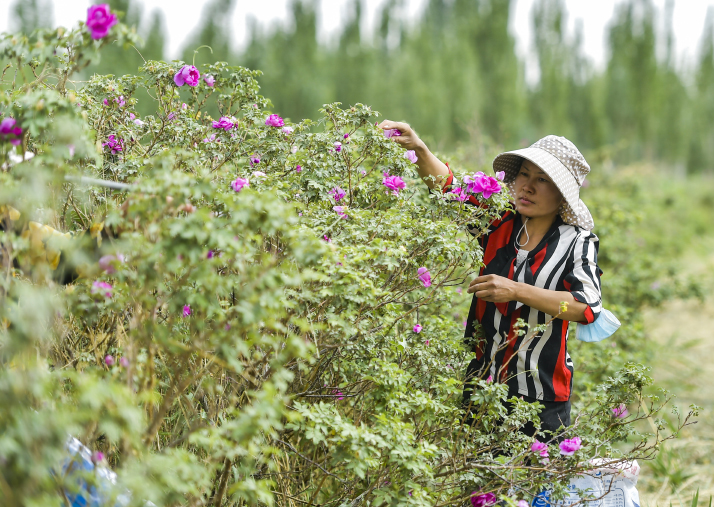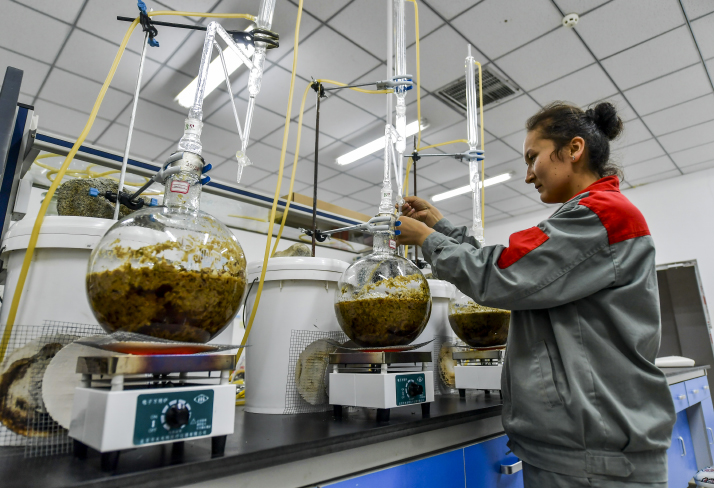| China |
| How a resilient rose variety is transforming Yutian County's ecology, economy and rural landscape | |
|
|
 A farmer harvests roses at the rose growing base of Xinjiang Yutian Guimi Biotechnology Co. Ltd. in Yutian County, Hotan Prefecture, Xinjiang Uygur Autonomous Region, on May 18, 2023 (VCG)
Roses are typically admired in gardens, but in Yutian County, Hotan Prefecture, Xinjiang Uygur Autonomous Region, they've become steadfast "sentinels," rooted in sand dunes to combat desertification. Yutian is located on the northern foothills of the Kunlun Mountains and the southern edge of the Taklimakan Desert—China's largest and the world's second largest drifting desert. On November 28 last year, Yutian completed the planting of 100,000 rose bushes, the final step in creating a 3,046-km sand-blocking green belt encircling the Taklimakan Desert. "Can roses really grow in the desert?" This is a common question among tourists visiting Yutian. Yutian has an arid climate, with large temperature differences between day and night and plenty of sunshine. This environment creates suitable conditions for the growth of specific rose varieties, and the county has a long history of rose cultivation. Roses were introduced to Yutian as early as the Han Dynasty (206 B.C.-A.D. 220) via the ancient Silk Road. Yutian roses are a unique variety adapted to desert conditions. Irrigated by snowmelt from the Kunlun Mountains, they possess rich medicinal, health-enhancing and aromatic properties. Initially, Yutian residents planted roses in their courtyards, using them to make rose jam and tea. In recent years, however, driven by economic prospects and the need for sand control and anti-desertification, Yutian roses have transitioned from courtyard gardens to the desert, becoming a vital economic crop. A difficult task The Yutian rose variety demonstrates remarkable drought tolerance thanks to its extensive root system. "Look, this is the rose's roots," Cai Xianfu, Secretary of the Communist Party of China Arele Township Committee in Yutian County, told Guangming Daily newspaper in late April, as he dug into the sandy soil, revealing the rose's crisscrossing root system, with the longest root reaching more than three meters underground. This robust root system not only provides access to deep water sources, but also plays a vital role in stabilizing the sand, contributing to dune stabilization and the overall improvement of the desert's ecological environment. Furthermore, Yutian desert roses tend to grow in dense clusters, forming lush vegetation. These thick branches and leaves effectively act as a barrier, reducing wind speeds and blocking sand. According to the Yutian County Forestry and Grassland Bureau, the local government has strategically planted rose belts in the areas of Yutian most vulnerable to wind and sand, acting as a frontline defense against desertification. However, successfully cultivating roses in such a harsh desert environment is a considerable challenge. The region's low rainfall and scarce water make large-scale growing difficult. Compounding the problem, frequent and severe wind and sandstorms can bury young rose bushes, hindering their growth. Cai recalls a particularly devastating sandstorm that swept through newly planted rose seedlings one year. Within hours, the powerful winds carried immense amounts of sand, completely burying nearly a third of the seedlings. Even after the buried seedlings were promptly excavated by staff, many did not survive due to severe damage to their root systems. To overcome these obstacles and foster successful rose cultivation, Yutian's related departments have collaborated closely with researchers. They have explored and implemented scientific growing techniques based on careful analysis of sand dune distribution, prevailing wind patterns and local hydrological conditions. A key innovation has been the adoption of a mixed "arbor plus shrub" planting model. In this approach, tall arbors serve as windbreaks at the forefront of the area, effectively reducing wind speed and mitigating the direct erosive impact of wind and sand on the roses. Complementing this, the well-developed root systems of shrubs intertwine with the rose roots, further stabilizing the sand, improving soil structure and creating a more favorable environment for rose growth. This approach greatly enhances the survival rate of the roses. Through this innovative growing method, specifically adapted to the unique challenges of the local environment, Yutian has successfully established an effective desert ecological protection system. This year, Arele Township plans to expand the rose growing area by an additional 1,200 hectares on the fringes of the Taklimakan Desert.  A staff member conducts an experiment to refine rose essential oil at the rose planting base of Xinjiang Yutian Guimi Biotechnology Co. Ltd. in Yutian County, Hotan Prefecture, Xinjiang, on May 18, 2023 (VCG)
Multiple benefits Growing roses in the desert not only combats desertification but also substantially boosts local incomes, thereby increasing villagers' motivation to participate in desertification control efforts. "Last year, my family's income increased by 63,000 yuan ($8,759) just from growing roses. And the government provides subsidies for growing roses," explained Maitusun Yibulayimu, a villager from Wanfang Village in Arele Township, to Sanqin Daily newspaper. Witnessing the gradual greening of the desert around him in recent years, he decided to contract 3 hectares of desert land for rose cultivation. "This has not only increased my income but also allowed me to contribute to anti-desertification efforts in my hometown," he added. The scale of rose growing in Yutian has continued to expand remarkably in recent years, with the current growing area in the county exceeding 5,000 hectares. In 2024, Yutian's rose flower output surpassed 12,000 tons, generating an average output value of 59,595 yuan ($8,285) per hectare. This economic success has driven substantial income growth for 4,238 households in the region. Today, Yutian's rose industry has blossomed beyond mere growing, evolving into a diverse and multifaceted enterprise. Xinjiang Yutian Guimi Biotechnology Co. Ltd. exemplifies this evolution, focusing on extending the industrial chain and boosting added value. Through intensified research, the company has created a diverse range of deeply processed rose products, including rose tea, essential oils and rose-based food products. Currently, the company operates a rose growing base spanning over 600 hectares. It now has a portfolio of over 70 different rose product types and has created more than 1,000 jobs. In Yutian, the value of roses transcends their role in sand control and income generation. A stroll through the local villages reveals clusters of roses blooming along the rural pathways. Public spaces have been thoughtfully landscaped, with rose-themed flower beds scattered in a well-proportioned manner, complementing the residences and creating a visually appealing environment. As the rose industry has developed, the county has skillfully integrated rose elements into rural landscape construction, enhancing the beauty of the local villages. Leveraging the extensive rose growing base, Yutian has also developed several eco-tourism attractions. These destinations offer tourists the opportunity to immerse themselves in a "sea of roses," participate in rose picking activities, and even learn about rose product creation. For instance, Arele Township is developing tourism centered on the rose industry, transforming itself into a leisure destination that integrates rose growing and picking, sightseeing, rose-themed banquets and educational tours. Jiang Donghui, Deputy Director of the Yutian County Forestry and Grassland Bureau, shared with Guangming Daily that, alongside expanding the growing area and scale, the county will prioritize technological innovation, industrial integration, digital transformation and green development. The goal is to further transform the desert rose industry into a robust pillar of the local economy, a "happiness industry" that empowers farmers to thrive and increase their income. Copyedited by Elsbeth van Paridon Comments to jijing@cicgamericas.com |
|
||||||||||||||||||||||||||||
|